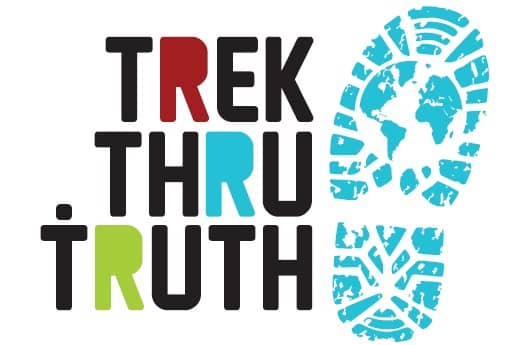This article originally ran in the Cleveland Daily Banner on February 6, 2019
Dr. Brian Peterson is a Lee University associate professor using his knowledge and findings of archeology to bring authentic life into the offerings at the planned museum called Trek Thru Truth.
As a biblical museum, Trek Thru Truth is striving to use nothing but the most genuine information and artifacts to tell the stories from Scripture. In order to do this, experts like Peterson were brought on board.
Originally from New Brunswick, Canada, Peterson is a professor of Old Testament and Hebrew. He earned four degrees in Biblical studies, and earned his Ph.D. at the University of Toronto.
He’s worked at Lee for eight years and was contacted by Doug Caywood, president of Trek Thru Truth, who was interested in Peterson helping the Bible museum with its authenticity as far as artifacts go, as well as serving as a point of contact at Lee.
“Doug is seeking to involve Lee students, whether it be working with the kids coming through the museum, or working some of the booths in it,” Peterson said.
Peterson has always been interested in ancient civilizations, as he and his wife, Christine Curley, traveled to Israel together years ago. While working as grunt labor moving large stones at the excavation site, Peterson was offered a role with the dig organization called Associates for Biblical Research, which works toward proving the truth behind Scripture through archeological discoveries.
Despite being a scholar, Peterson worked many of his younger days as a carpenter, and it was this experience that helped him while working with ABR, due to his knowledge of building designs.
“Within the first year, they asked me if I’d want to be a ‘square supervisor,’ where you excavate a small, 6-by-6 [foot] square with a small crew. I did the training and have been doing it for 10 seasons now,” he said.
While there are countless books on archeology, Peterson says you won’t truly grasp it until you experience it yourself, in what he calls “getting your hands dirty in the Bible,” or “digging the Bible.”
ABR’s dig is the largest in Israel, and has nearly 150 volunteers who come out for a period of four or five weeks to aid the conservative evangelical team. These volunteers come from all over the world, including the U.S., Germany, Israel and other nations.
The organization’s founder, Dr. David Livingston, noticed that between the 1930s and 1960s, there was a movement by archeology to unhitch the field from the Bible, as many experts believed Biblical archeology was far too subjective. As a conservative group, ABR has made it its mission to use its findings to validate the Bible. It is currently in the process of publishing findings that suggest more secular archeologists have been looking in the wrong location for years as they search for Joshua’s Ai, a city the biblical figure conquered.
According to the ABR brochure, “a field that was once filled with Bible-believing individuals is now overrun by skeptics, atheists, agnostics and those committed to the destruction of the Bible as a legitimate source of true, historical info. Revisionists cloak themselves with supposed objectivity, purity of motives and the superiority of science over the ‘uninformed’ and ‘unscientific’ religious community. They regularly mock those who question their worldview and their conclusions by name-calling and the worst forms of anti-Bible and anti-Christian propaganda.”
Each time he goes to the dig site, Peterson brings home bags filled with ancient Israeli pottery, as it’s a common sight in the country and is essentially given away; however, for a college professor, the educational opportunities surrounding these items are abundant, and he plans to donate a large amount of the pieces to Trek Thru Truth to use in the museum’s archeological “dig site” for kids.
As a professor, Peterson often gauges his students on what sort of Bible stories they learned growing up, and what they’d like to have learned more about from Scripture, as he believes Bible illiteracy is a growing concern.
“I’m not sure if several churches today just aren’t teaching the Scripture or what it is, but I know the programs could do better in teaching kids about the Bible,” Peterson said.
He said some of the students who come through his classes know who Adam and Eve are, but beyond that, patriarchs such as Abraham, Isaac, Jacob, etc. are virtually unknown to some.
One benefit of his explorations is that Peterson uses them to educate his students and get them interested in biblical works, such as displaying pottery he’s found or explaining the various uses for different types of relics.
Since travel in the Middle East can be dangerous in several countries, he’s limited his archeological travels to Israel.
He also said archeology can be a slow process. As a testament to this, the Khirbet el-Maqqatir information from Israel has just now been published, yet its research was first started in 1995.
“A lot of times, archeology is hard work. You spend decades excavating sites in order to get enough information compiled to prove your theory or point. We aren’t like Indiana Jones,” Peterson said.
In working with Trek Thru Truth, Peterson hopes to expand the country’s knowledge of Scripture and increase biblical literacy on a larger scale.
“The United States is based on Judeo-Christian principles, and understanding the biblical text is so important in a society in which biblical literacy is going down. Parents should bring their kids to Trek Thru Truth when it opens, to expose them to these stories and this information,” he said. “It’ll be a great time for all ages.
For more information, contact Peterson at bpeterson@leeuniversity.edu or go to www.trekthrutruth.com.
